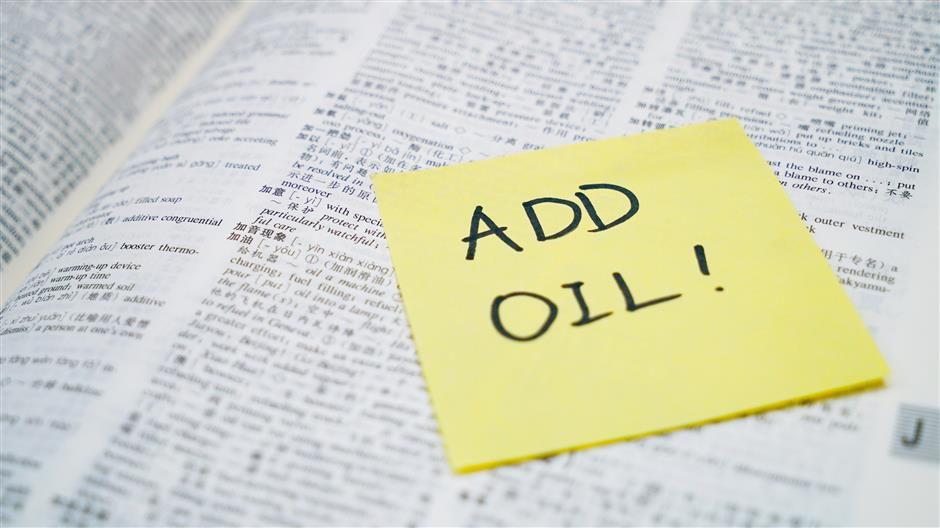The Oxford English Dictionary added some oil, but why?

The Oxford English Dictionary recently added an English translation of a famous Chinese phrase, but some are confused.
One of the first expressions you’ll come across studying Mandarin Chinese — especially as you cower in tears at the impossibly high mountain standing before you — is the term “jia you,” a term which, although without an accurate English translation, is basically a form of encouragement. A pickup when times are tough.
You’ll hear it screamed out at sports matches, muttered to tired workmates about to enter overtime, and laid on students of Mandarin every day as they hang over the metaphorical cliff of no hope.
Since the term has no real direct translation into English, some have come up with approximations along the way to stand in its place.
The problem is, the term can be used in different situations, making one translation far from adequate. You can say “jia you!” to someone trying their best to eat the rest of their huge hamburger, and you can say “jia you” to your favorite aunty as she lies on the operating table about to go under the knife.
Chinese people online tend to often translate the word, when the situation calls for an English translation, into “fighting!” which is, to any native English speaker, as atrocious as a translation can be. “That English translation actually comes from South Korea,” Grace Huang, a Mandarin teacher from Shanghai’s MasterChinese told me.
Others, apparently, will directly use the English term “add oil.”
I say “apparently” because, truth be told, I’ve never seen this translation anywhere, and I do spend quite a lot of time perusing Chinese social media.
That’s why I was a bit confused when someone thought the phrase ubiquitous enough to add the term to the Oxford English Dictionary.
Hong Kong-lish?
It turns out, despite Western media outlets describing the addition as a win for the “popular Chinglish phrase,” the term “add oil!” — by the way, it was added to the dictionary complete with exclamation point — is really only popular in Hong Kong, and not really a thing at all on the mainland.
“It’s Hong Kong-lish!” one of my bosses said when I launched an unscientific poll on the topic.
As it turns out, Hong Kong folks are as proud of their special brand of English as the Singaporeans are. Okay lah?
That’s why “add oil!” being added to the Oxford English Dictionary is being celebrated so widely across Hong Kong. Some are arguing that it’s a nod to, or some sort of legitimization of, Hong Kong English.
For me, though, I’d probably find it a bit disconcerting to hear my native language bastardized in such a way, and I’m sure my Chinese friends might feel the same way when they hear me perform Mandarin massacres from time to time.
Usage among foreign students of Mandarin
One of the only places I’ve heard the direct English translation of the term “jia you!” used in real life is amongst foreign students of Mandarin, but even then it’s only in gest and not used at all seriously. It’s more of a wink-wink nudge-nudge in-joke. A kind of ode to our neverending struggle with this difficult language.
But, then again, that’s not super widespread, and many of my Chinese language classmates don’t agree. “I’ve never heard ‘add oil!’ used like that — it sounds dumb,” a New Zealand student of Mandarin currently living in Hangzhou said.
“I think it would be better to say ‘fuel up’ or ‘add petrol’ as that seems to be where the Chinese saying came from, and would capture the meaning better.”
I guess that’s because we aren’t studying Cantonese and we don’t live in Hong Kong, in which case the situation might be a little different.
How are words added to the dictionary?
Contrary to popular belief, there isn’t a team of academics running around looking for cool phrases and new terms to add to the Oxford English Dictionary — quite the contrary.
As the Oxford English Dictionary say themselves, “our dictionaries describe the way languages are used, rather than saying how they should be used.”
Words are added after careful consideration, based on different methods of word collection and inclusion.
They include analyzing massive amounts of language data to ascertain real world usage and popularity of words.
After that, lexicographers and language experts determine priority, look at evidence, and give advice on pronunciation and usage.
Mandarin Chinese words added to Oxford
There are plenty of popular Mandarin Chinese terms that I’d love to see included in the Oxford English Dictionary, but they’d first need to reach some sort of wide usage in English writing.
Some that have already made the cut include “feng shui,” “qi,” and “yang” from “yin yang” (I’m not sure why that phrase wasn’t included in its entirety.)
There are also a few broken English terms, like the ubiquitous “long time no see” which have entered wide English usage and may or may not be inspired by Chinese (“haojiu bujian” is a popular Chinese term which translates directly as “long time no see.”)
So how will the inclusion of “add oil!” into the Oxford English Dictionary affect our lives? To be honest, it probably won’t.
I say “probably” because now, technically, the term can be considered as proper English. “Now we can officially use it in Shanghai Daily,” another boss exclaimed. I couldn’t tell if he was joking or not. I hope he was.















